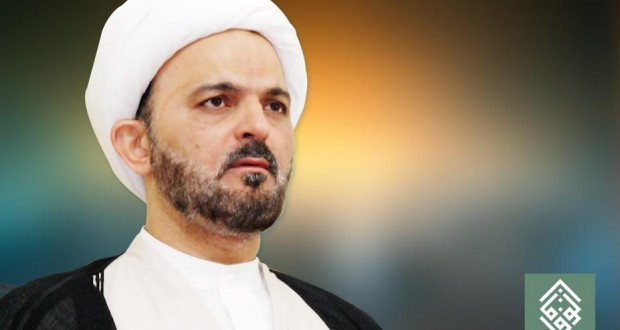
Rasa News Agency reports - Al Wefaq National Islamic Society commented on the statement issued by the Interior Ministry yesterday where it officially admitted the Authority’s forced deportation of Ayatollah Sheikh Hussain Alnajati. Al Wefaq said the deportation of Alnajati crossed humanitarian and legal boundaries and illustrates the Authority’s persistence to act against the International Law for Human Rights. In fact, the measures even contradict local laws, regardless of their accordance with the International Standards
Ayatollah Alnajati has been forced to leave the country under threats by senior officials in the State. This followed the revocation of his citizenship some months ago.
The Bahraini Authority did not comment immediately on circulated news about the deportation of Alnajati yesterday. It remained silent for some time before finally a statement was issued by the Interior ministry confirming the news. Al Wefaq said the Interior ministry’s statement is a frank declaration to target the Shiite sect and practice sectarian persecution. The statement declared the Authority’s disrespect to the religious beliefs of the Shiite sect and intention to target its clerics. The statement declared the main reason behind Alnajati’s forced deportation is because he acted as a representative of the grand Shiite cleric Ayatollah Sayed Ali Alsestani. This is a religious responsibility within the Shiite sect and beliefs and is ensured by international covenants regarding religious freedom. The State should not have power over religious beliefs and freedoms. This role, within the Shiite sect, existed before the establishment of the modern state. Representatives of grand Shiite clerics have not and should not have to take permission from the State to exercise their rights within religious freedom in accordance with international covenants. Therefore, the Interior ministry’s requirement from the clerics to take permission is considered a threat to all Bahraini Shiite clerics.
Al Wefaq said the rights violations against Alnajati go beyond targeting Alnajati in person and are added to the State’s demolishing of Shiite mosques, denial to Shiite religious education, provocation of and incitemnt against Shiites in State- media, and which is sponsored by senior State-officials, let alone discrimination in jobs and scholarships.
Nonetheless, the deportation of Alnajati is also linked to his refusal to condemn the popular movement for democratic transition in Bahrain.
The funds collected by the representatives of grand clerics within the ashoote sects are the donations (Khoms*) paid as a religious duty of worship and cannot be considered to contradict with one’s national identity.
Al Wefaq concluded that the forced deporation of Alnajati, under the mentioned reasons in the satement of the Interior ministry, implies the situation of Bahrain be looked into in accordance with the International Law to address the sectarian persecution practiced under legal cover.
The Bahraini local law does not require clerics to take permission from the State to practice the mentioned role, as the Interior ministry claimed.
Al Wefaq called on the international community to act in accordance with international procedures against this persecution. Such sectarian measures contribute to raising tenstion in the region.
/Al Wefaq/